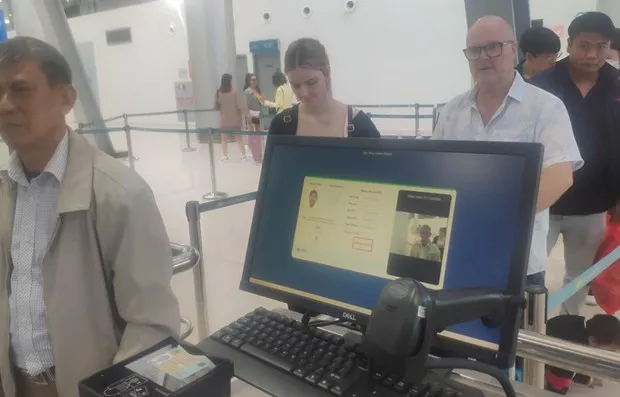Van Don Airport to pilot facial recognition tech for passengers
The high-tech measure is expected to improve the airport's operational efficiency and the detection of aviation violations.
Van Don International Airport in the northern province of Quang Ninh is to pilot facial recognition (biometric authentication) for passengers at the check-in counter, according to the Civil Aviation Authority of Vietnam (CAAV).
After Cat Bi International Airport in the northern city of Haiphong, this is the second airport in the country to pilot this advanced facial recognition technology.
Travelers using chip-based citizen ID cards must go through a facial recognition system at the security check.
The screening system uses VeriPAX software developed by the Airports Corporation of Vietnam (ACV).
VeriPAX software displays all information read from ID cards and itinerary information associated with the passenger list to verify information on ID cards and boarding passes.
Aviation officers will allow passengers into the screening area if the ID cards and facial images' information matches the travel information.
Passengers have been verified by biometric authentication as they pass through the security checkpoint at the Cat Bi International Airport as of the beginning of February. Photo: The Airports Corporation of Vietnam |
The software also alerts passengers when their baggage needs to be visually inspected. It also processes passengers with different types of identification.
The high-tech measure is expected to improve the airport's operational efficiency and better identify aviation violations, such as fake IDs, cross-border criminals and people banned from flying.
In addition, facial recognition technology is expected to contribute to maintaining social order and security, reduce the time spent on check-in procedures, and increase accuracy.
The CAAV has asked Van Don Airport to take measures to prevent congestion and handle situations that may arise during the trial period. It has also asked the airport to coordinate with relevant agencies and businesses to evaluate the effectiveness of the pilot application in terms of aviation security risks and passenger convenience.
Domestic flights only will be subject to the test. Van Don International Airport will complete and report to the CAAV on the pilot implementation of automated biometric authentication for passengers. The airport will officially implement biometric authentication for passengers before June 30 following the pilot program.
In addition, the CAAV has requested ACV to continue the pilot program in other airports.
Previously, Cat Bi International Airport set up a single biometric authentication line for passengers with chip cards on February 1.
Cat Bi is the first airport in Vietnam to install pilot equipment and software. The airport has screened 758 travelers using the system. The number of ID card recognition was 746, more than 98%, and the face recognition rate by cameras was 100%.
The average time to process a passenger is 60 seconds, while the average time to read an ID card and boarding pass is about 15 seconds per passenger.
The test results showed that the system effectively supported aviation security forces in passenger screening.
However, the CAAV reported that the facial recognition technology trial period at Cat Bi Airport did not clearly demonstrate its advantages and disadvantages. Therefore, the authority is seeking approval from the Ministry of Transportation to extend the trial period of biometric authentication at Cat Bi and other airports.
Chip-based ID cards and biometric authentication for airline passengers are expected to be implemented nationwide later. The Ministry of Transport has been tasked to work with the Ministry of Public Security to implement the process in 2023.
This is part of the plan to set up an electronic system that links the aviation security control force and a database of citizens' identities to check domestic flight passengers.











